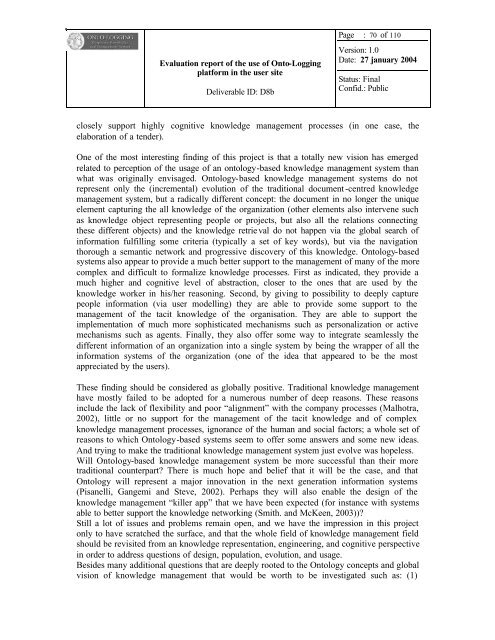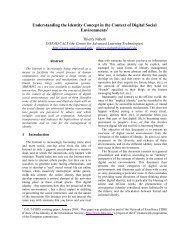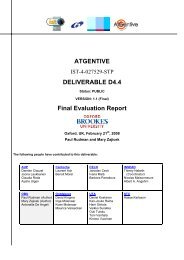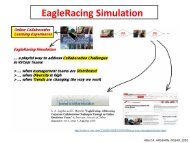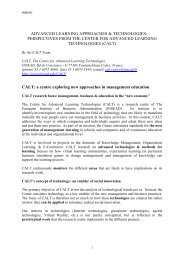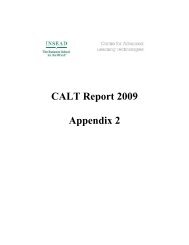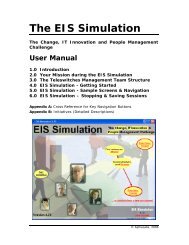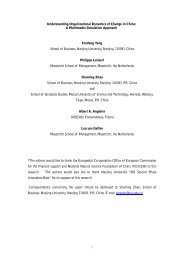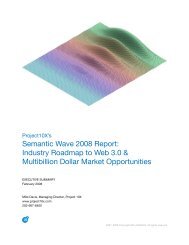pdf 820Kb - INSEAD CALT
pdf 820Kb - INSEAD CALT
pdf 820Kb - INSEAD CALT
You also want an ePaper? Increase the reach of your titles
YUMPU automatically turns print PDFs into web optimized ePapers that Google loves.
Evaluation report of the use of Onto-Logging<br />
platform in the user site<br />
Deliverable ID: D8b<br />
Page : 70 of 110<br />
Version: 1.0<br />
Date: 27 january 2004<br />
Status: Final<br />
Confid.: Public<br />
closely support highly cognitive knowledge management processes (in one case, the<br />
elaboration of a tender).<br />
One of the most interesting finding of this project is that a totally new vision has emerged<br />
related to perception of the usage of an ontology-based knowledge management system than<br />
what was originally envisaged. Ontology-based knowledge management systems do not<br />
represent only the (incremental) evolution of the traditional document -centred knowledge<br />
management system, but a radically different concept: the document in no longer the unique<br />
element capturing the all knowledge of the organization (other elements also intervene such<br />
as knowledge object representing people or projects, but also all the relations connecting<br />
these different objects) and the knowledge retrie val do not happen via the global search of<br />
information fulfilling some criteria (typically a set of key words), but via the navigation<br />
thorough a semantic network and progressive discovery of this knowledge. Ontology-based<br />
systems also appear to provide a much better support to the management of many of the more<br />
complex and difficult to formalize knowledge processes. First as indicated, they provide a<br />
much higher and cognitive level of abstraction, closer to the ones that are used by the<br />
knowledge worker in his/her reasoning. Second, by giving to possibility to deeply capture<br />
people information (via user modelling) they are able to provide some support to the<br />
management of the tacit knowledge of the organisation. They are able to support the<br />
implementation of much more sophisticated mechanisms such as personalization or active<br />
mechanisms such as agents. Finally, they also offer some way to integrate seamlessly the<br />
different information of an organization into a single system by being the wrapper of all the<br />
information systems of the organization (one of the idea that appeared to be the most<br />
appreciated by the users).<br />
These finding should be considered as globally positive. Traditional knowledge management<br />
have mostly failed to be adopted for a numerous number of deep reasons. These reasons<br />
include the lack of flexibility and poor “alignment” with the company processes (Malhotra,<br />
2002), little or no support for the management of the tacit knowledge and of complex<br />
knowledge management processes, ignorance of the human and social factors; a whole set of<br />
reasons to which Ontology-based systems seem to offer some answers and some new ideas.<br />
And trying to make the traditional knowledge management system just evolve was hopeless.<br />
Will Ontology-based knowledge management system be more successful than their more<br />
traditional counterpart? There is much hope and belief that it will be the case, and that<br />
Ontology will represent a major innovation in the next generation information systems<br />
(Pisanelli, Gangemi and Steve, 2002). Perhaps they will also enable the design of the<br />
knowledge management “killer app” that we have been expected (for instance with systems<br />
able to better support the knowledge networking (Smith. and McKeen, 2003))?<br />
Still a lot of issues and problems remain open, and we have the impression in this project<br />
only to have scratched the surface, and that the whole field of knowledge management field<br />
should be revisited from an knowledge representation, engineering, and cognitive perspective<br />
in order to address questions of design, population, evolution, and usage.<br />
Besides many additional questions that are deeply rooted to the Ontology concepts and global<br />
vision of knowledge management that would be worth to be investigated such as: (1)


